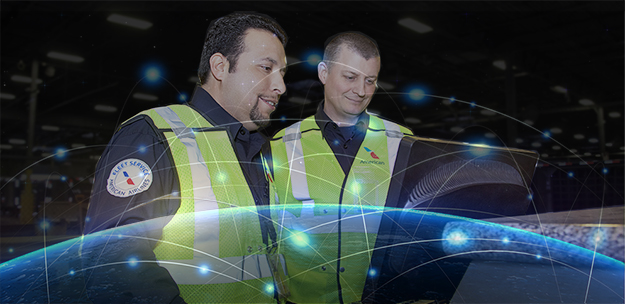Jessica Tyler vividly remembers growing up in a typical American suburban home with a pea green refrigerator that sported a cartoon dinosaur torn from the newspaper with the caption, "Adapt or Die."
"Other things – photos, notes – came and went over the years, but that cartoon stayed up there, and it always stuck with me," she said.
She admits she didn't expect it to have such a large impact on her when her mom posted it to that refrigerator during her childhood, but to Tyler, it's been a guiding principle for her entire life.
Today, American Airlines Cargo's managing director of culture & transformation is leading the charge to shift the industry's mindset around technology. To her, change is inevitable. And those who don't adapt will go the way of the dinosaurs.
 Jessica Tyler (center), along with Angela Hudson (left) and Kelly Shoaf (right), during a recent visit to India. Tyler and her team are keeping American ready for an unknown future. |
Innovating at the edge
"Air cargo is ripe for disruption," she said. "We already see people innovating at the edges. We all need to make sure we add value to the chain, or we risk being irrelevant."
She's overseeing the iCargo implementation as American transforms 91 legacy systems into less than 10. But beyond the major transformation the company is taking to update its systems and processes to be better prepared for the future, Tyler is hard at work instilling a forward-thinking mindset across the organization and the industry.
"As we all know, our industry is going through unprecedented change driven by technology," she said. "I love the dedication to technology, but we overlook an even more important part of the equation almost every time – the human beings who leverage these technologies."
To hear it from Tyler, it's only through collaborative, open discussion about technology and the people and processes around them that the industry will finally take the leap forward to take advantage of the opportunity in front of it.
Airspace Technologies is one such company nipping at the technological edges of the air cargo industry.
After more than a dozen years running several logistics companies of his own, Bulcao was frustrated that they had no real technology or transparency available in the space. He said these inefficiencies were especially clear when he purchased First Delivery, a same-day, time-critical delivery service.
"I called Ryan (Rusnak), told him my frustration, and he flew out from Washington, DC," Bulcao, who now serves as Airspace Technologies' CEO, said. "We wrote down everything that was wrong with the industry. We chose the NFO (Next Flight Out) space to start. Same-day, time-critical customers value our service.
"The margins in logistics can be pretty thin. This niche customer was willing to pay for the costs that go into creating a company like this."
Rusnak, who now serves as CTO of Airspace Technologies, said in the beginning that customers did not trust the technology.
"They wanted to talk to someone," Rusnak said. "They would look at the information on their phones, but then they would call to confirm. Now they don't mind pulling out their phone to check their status. In fact, most prefer not to call us now."
The company launched in January 2016 and by February 1, they had their first customer. They now have more than 45 employees servicing more than 50 clients.
Smaller companies have an advantage over larger ones when it comes to embracing technological change.
"We are ripe for disruption because our big companies have a harder time moving quickly," Tyler said. "We have 40 years of legacy baggage (no pun intended), and the inertia that goes with that. We have a lot of hurdles in the industry to get around our legacy systems and processes."
Redefining the vision
Evolving decades-old technology can be a monumental task.
Don Bender, American's manager of cargo distribution channels and eFreight, said, "We have a lot of challenges with our own legacy systems. We have about 90 different IT systems, but we're not letting that stop us from moving ahead."
Even as they move ahead with their IT investment, American Airlines Cargo continues to scan the horizon for new technologies while taking on a leadership role within the International Air Transport Association (IATA).
Bender, who serves as chair of IATA's eCargo working group, said they are gathering information from all of the stakeholders in the freight industry, even the ones beyond air freight. He views it as important to incorporate not just the air freight industry, but to include the entire multimodal logistics chain.

To accomplish this great undertaking, technical and process standards have to be set so that information can flow in an integrated fashion.
"Freight forwarders use ocean, rail and trucks, too," Bender said. "We want the focus on our new systems to be from the customer's point of view, and create one record for all shipments, no matter where and how they move."
Everybody knows about the push to digitize the air waybill and the challenges that have come with that.
"The challenge of moving from the paper airway bill is, ‘How can we make it beneficial and cost-effective if everyone isn't using it?'" Bender said.
In the short term, maintaining two processes is time-consuming and expensive. Most parties understand that it will save money and time in the long run, but in the meantime, driving adoption industrywide has struggled to find the right incentive to bring every party to the table.
Bender points to Latin America as an example with its widespread use of paper and high number of legacy computer systems. And smaller companies that have no cargo system or have limited systems that cannot connect to eFreight systems still play an important role in the chain.
Often the answer to these pressing questions defaults to the latest and greatest technology. This time, it's the concept of blockchain and the ONE Record initiative proposed by IATA.
And while Tyler applauds the idea of technology helping to address long-standing and outdated processes, she cautions industry leaders to avoid viewing technology as the silver bullet. Instead, view technology as an enabler to the processes and mindset shifts that are necessary to advance the industry.
While it's important for individual players to apply new technologies to solve issues, there is a more global shift that has to occur in the industry around how we share and pass information across all the players. The amount of time and money that goes into each of us trying to solve the issues we all face is a slow and inefficient way to achieve the vision we have for this industry.
"You can't just incrementally and independently morph. It's about re-inventing the way this industry fundamentally works together."
"It's more about how to achieve the vision of the future," Tyler said. "You can't just incrementally and independently morph. It's about re-inventing the way this industry fundamentally works together."
Bender is working on making American more proactive in its problem-solving.
"We want to be proactive, not reactive, and offer even higher levels of customer service," he said. "For example, if we can have real-time information available to all parties from first mile to the last mile, then we can extend cut-off times for drop off and pick- up and provide a bigger benefit to our customers."
"We'll be able to eliminate the time that we spend now on our manual processes culling through documents that can be more than 20 pages long, and get packages on the tarmac and into the planes faster," he said.
This sort of forward-thinking, problem-solving mindset is creeping into conversations throughout the industry.
"As technology improves, visibility gets better and customer's expectations constantly rise," Tyler said. "We have to fundamentally change as our customers' expectations change. It always goes back to ‘Adapt or Die' for me."
Shifting mindsets
Airspace Technologies' co-founders have seen this first-hand.
"People have been waiting for this," Bulcao said of their cargo-tracking technology. "Customers come in and want to brainstorm with us on how to improve our service. The coolest part is that people are seeing us as good at one thing, and now asking if we can do different things. Now it's a collaboration."
For air cargo, that seems like the inevitable next step. But first, the paper has to go.
Whether it’s IATA’s One Record solution or a similar one that works across all forms of freight transportation, American believes that it should allow all relevant parties access to one freight bill in one place instead of having to send it around with the shipment itself. This blockchain-style solution would give everyone version control and the most up-to-date information.
American and other key players in the value chain are pounding the table with the belief that the days of hoarding data to maintain a competitive advantage are numbered. With disruptors like Airspace Technologies on the way, the new game is not whether you have more data than your competitors but being able to leverage that data better to create unique value for your customers.
"The beautiful thing is that this industry is full of passionate, experienced, talented professionals. It's on us to work together to shift our mindsets and work together differently to get it done."
The independent travel agents who hoarded passenger airline fares or ticket stock, believing they had a competitive advantage, are no longer around. Instead, the ones who perfected how to use universally available data and promote transparency to the end consumer have thrived.
"Simply having One Record with consistent data is not the most significant aspect of this step forward,” Tyler said. “What is significant is the opportunity that this will open up for us to invest in new ways to communicate with and help our customers."
"We have to be able to continually look for ways to not only meet what customers want or need today, but also find ways to improve or create value that customers aren’t yet asking for,” she said. “With the right technology and talent to leverage vast amounts of data, we can garner unique insights and ensure we stay relevant."
In order for the next generation of air cargo transportation to truly take off, the industry will need to embrace change by redefining its mindset surrounding technology and information sharing, and we'll all need to be open to redefining the value we provide.
Tyler's parting nudge said with a smile, "The beautiful thing is that this industry is full of passionate, experienced, talented professionals. It's on us to achieve the vision and to do the work to shift mindsets and work together differently to get it done. Adapt or die, folks."
### |
Like this article? Have feedback or questions? Let us know.
About the Author
 Juli R. Branson has been a professional writer and marketing/public relations adviser for more than 20 years. She has worked with corporate CEOs, members of the President's cabinet, university professors and small business owners. Her writings have won numerous professional awards and major media outlets as well as small, trade publications, have quoted her clients.
Juli R. Branson has been a professional writer and marketing/public relations adviser for more than 20 years. She has worked with corporate CEOs, members of the President's cabinet, university professors and small business owners. Her writings have won numerous professional awards and major media outlets as well as small, trade publications, have quoted her clients.
